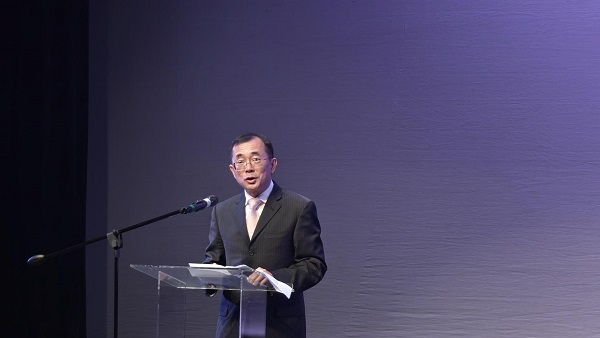Cultural Bridges Wuju Opera Captivates Johannesburg Audience
By Thembi Moyo
On 22 September, the Arts Centre Theatre at the University of Johannesburg (UJ) came alive with the vibrant sounds, movements, and stories of Wuju Opera, a traditional Chinese theatre form with a history spanning nearly 500 years. The performance, organized by the Zhejiang Wuju Opera Research Institute, drew an audience of faculty, students, and local residents eager to experience a unique facet of Chinese culture. Among the distinguished guests was Minister Qin Zhanpeng, who delivered remarks highlighting the significance of the event. UJ’s Vice-Chancellor and Principal, Professor Letlhokwa Mpedi, and Professor Federico Freschi, Executive Dean of the Faculty of Art, Design and Architecture, were also in attendance.
In his address, Minister Qin introduced Wuju Opera as a rare and treasured example of Chinese artistic heritage. He noted its distinctive style, intricate performance techniques, and the rich cultural value that has been carefully preserved and passed down over centuries. “Wuju Opera is not just a form of theatre,” Minister Qin said, “it embodies the stories, values, and artistic expressions of generations. Its music, movements, and narratives carry the heart of Chinese culture.” Drawing a thoughtful comparison, he observed that South Africa’s diverse traditional arts share a similar depth of history and cultural significance. Despite the geographic distance between the two countries, he emphasized that the appreciation of art is a universal language, capable of connecting people across continents. The Minister described the evening’s performance as a unique opportunity for cultural exchange, allowing South African audiences to engage directly with the beauty and emotional resonance of Chinese culture.
The performance itself was a feast for the senses. Actors displayed impressive martial arts sequences, accompanied by the melodic strains of traditional instruments and punctuated by intricate dance movements. Mythological narratives unfolded on stage, bringing to life stories that have been cherished in China for centuries. The audience was visibly absorbed, reacting with applause, laughter, and expressions of genuine emotion throughout the evening. Students and faculty from UJ, alongside community members, were seen leaning forward in their seats, captivated by the skill and artistry on display.
Beyond the performance, the event represented a broader effort to strengthen cultural ties between China and South Africa. By sharing a traditional art form that is both ancient and dynamic, the organizers and performers provided a platform for mutual understanding, appreciation, and dialogue. Minister Qin remarked that such exchanges are essential for fostering friendship and collaboration, noting that cultural experiences often form the foundation for deeper relationships between nations.
As the final notes faded and the actors took their bows, the audience rose in applause, celebrating not only the performance but the cultural bridge it represented. The Wuju Opera performance at UJ was more than a display of artistic skill; it was a testament to the enduring power of culture to connect, inspire, and unite people across borders.





